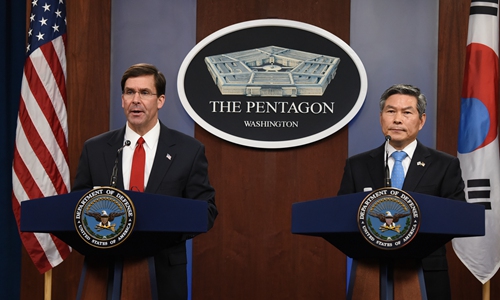US troop pullout trick aims to pile pressure on S.Korea
By Du Wenlong Source: Global Times Published: 2020/7/19 19:43:41

US Secretary of Defense Mark Esper meets with visiting South Korean Defense Minister Jeong Kyeong-doo on February 24, 2020. Photo: CNS
The Wall Street Journal recently reported that the Pentagon presented the White House with options to reduce the US military presence in South Korea. But Trump officials said they have not decided to reduce forces in South Korea.The White House may not approve of these options. It is evident that Washington might mainly be hoping to raise anxiety in Seoul with this report. Seoul and Washington disagree about the costs of hosting US forces in South Korea. The current US goal is to prod South Korea to meet the US' demand to pay much more. It is a form of US strategic blackmail.
If the US reduces its military presence and protection over South Korea at present, then South Korea's current military capabilities cannot afford to withstand potential security threats on its own. It will face problems with collecting intelligence, making battle plans, and coordinating with US forces. This will make Seoul nervous. As a result, under US pressure, South Korea may have to meet American cost-sharing demands.
Actually, the US can benefit from reducing its military presence in South Korea, since US troops could be target in times of conflicts.
Meanwhile, within a global context, Trump announced in June that he wants to pull US military personnel out of Germany. Former US ambassador to Germany Richard Grenell said in June that Americans, "are getting a little bit tired of paying too much for the defense of other countries." In a commencement ceremony at the US Military Academy at West Point in June, Trump said, "We are ending the era of endless wars…In its place is a renewed clear-eyed focus on defending America's vital interests. It is not the duty of U.S. troops to solve ancient conflicts in far away lands that many people have never even heard of."
This is the "America First" policy in the US' overseas strategy. If the US had no interests overseas, then there would not be a need for it to spend a single dollar outside its borders. It could instead focus completely on defending its own territory.
The US believes that its current international situation is different from that during the Cold War, and that the country's domestic security is worsening. Rather than spending huge military expenditures overseas to defend other countries, the US feels it is better to protect itself. The US has made too many enemies overseas. The country itself has become a target or revenge. The 9/11 attacks are an obvious example.
The US may have a new perspective on being world police. While many in the US think they should still play the role of global cops, they don't think they should have to pay out of their own pockets to do so. America may only keep acting as the world's police if the benefits outweigh the losses. The US may not be a troublemaker as well, because it would not want its homeland to suffer from terrorist attacks due to its chaos overseas such as conducting anti-terrorism operations overseas.
Some of the US troops pulled out from South Korea may move to the entire Asia-Pacific theater. Trump has planned to redeploy about 10,000 US troops from Germany to the Indo-Pacific region. But the US may not deploy them to traditional locations in the Indo-Pacific. The US may redeploy them to safer areas such as the second island chain and the third island chain.
Withdrawing troops from its allies may impose short-term impacts on the US' alliance system worldwide. Why? Because it will affect the homeland security of its allies. In the short run, it will cool down relations between the US and its allies. This may lead US allies to think that such alliances are unreliable and that the US has abandoned them.
But it may not have much impact in the long run. The US believes its superior strength is not to position US troops overseas, but to provide long-range protection and nuclear protection for its allies. The core is to develop long-range prompt strike capabilities.
The author is a military expert. opinion@globaltimes.com.cn
Posted in: VIEWPOINT